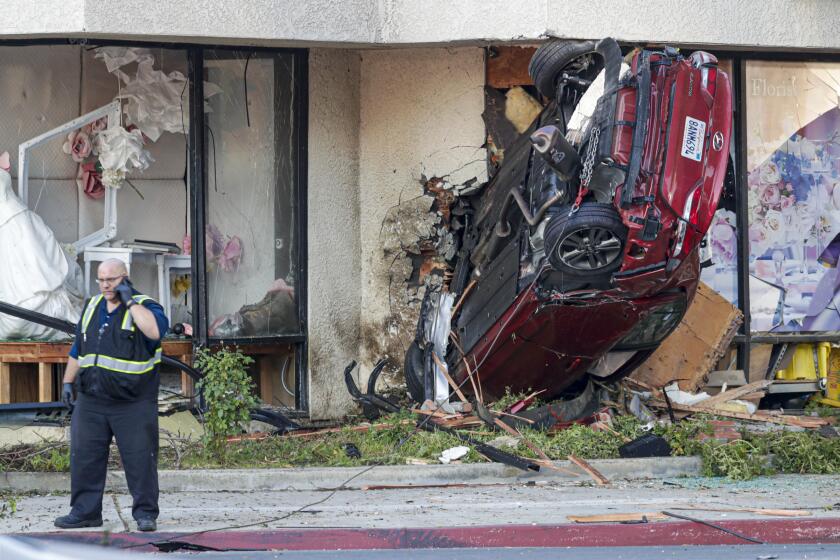California’s budget: It’s time to make a deal
Time is running out for the Legislature to ask voters to extend four temporary tax increases that were due to expire this year. The extensions, which would cost taxpayers about $12 billion over the next 18 months, are a tough sell at a time of high unemployment and sluggish growth. But the budget plan endorsed Thursday by Democrats on a legislative conference committee would also make deep, meaningful spending cuts, and supporters have made a persuasive case that letting the temporary tax hikes expire would force core public services to be slashed further in almost unthinkable ways. Republicans, however, continue to hold out, and the plan can’t move forward without at least two GOP votes in each chamber. We urge lawmakers to strike a deal soon that sends the tax proposal to the voters.
Within days of Gov. Jerry Brown’s election in November, the state Legislative Analyst’s Office announced that Sacramento faced shortfalls of $6 billion in the fiscal year ending June 30 and $19 billion in fiscal 2011-12. The problems included the “painfully slow” economic recovery, less federal aid and higher program costs than anticipated, and the expiration of temporary measures used to close previous budget gaps.
The latter include four short-term tax hikes adopted in 2009: a 1-percentage-point increase in the sales tax; a 0.5-percentage-point increase in the vehicle license fee; a 0.25-percentage-point increase in marginal income tax rates; and a $210 reduction in the credit that taxpayers can claim for dependents. The proposed budget would keep the higher rates in effect for five more years. That wouldn’t help the state’s economy recover faster, but at least the tax burden would be no higher than it was in 2010.
Following Brown’s lead, the Democratic conferees more than matched the temporary tax increases with cuts in social programs. Poor adults trying to make the transition from welfare to work would have their state aid cut by 8%, and the assistance would end after four years, not five. Low-income families would be charged co-pays for the first time when they visited the doctor or dentist, filled a prescription or went to the hospital. Mental health programs would be cut by $861 million, and community redevelopment funding for blighted neighborhoods would be wiped out. Aid to preschool programs would be slashed by $1 billion. Half a billion dollars would be cut from the University of California system, and an equal amount from the California State University campuses. Aid to community colleges would drop $400 million, and student fees would be raised $10 per unit.
The list goes on and on. Funding for in-home healthcare services would be cut by almost half a billion dollars. Grants to the poorest elderly and disabled Californians would be reduced to the minimum allowed under federal law, and grants for daycare centers that serve adults with Alzheimer’s, mental illness and other disabilities would be eliminated. The conferees also proposed cuts to state courts, prisons and firefighters, among many others.
Granted, lawmakers could cut spending even more and raise less revenue. But as the Legislative Analyst’s Office has noted, closing the entire budget gap without tax increases would make it all but impossible to avoid multibillion-dollar reductions in public education and additional deep cuts to public safety and transportation.
Not extending the tax increases would automatically reduce Proposition 98 funding for schools by $2 billion. That’s just for starters. The no-tax-increases alternative prepared by Legislative Analyst Mac Taylor called for more than $4 billion in cuts to K-12 education, which would force schools to lay off teachers, jam more students into classrooms and, possibly, shorten the school year by two weeks.
Taylor’s alternative also suggests cutting an additional $1 billion from the UC and CSU systems and $1.1 billion more from safety-net programs, halting bond sales and many state construction projects, cutting road and mass-transit projects by $400 million, slashing taxpayer support for fighting wildfires, eliminating half a billion dollars’ worth of public safety grant programs, cutting parole supervision periods in half and idling state workers an additional two days a month through furloughs.
Advocates of smaller government don’t have to go that far to declare victory. The total spending level that Brown proposed and that Democrats have embraced, even with the extension of the expiring tax breaks, is 12% lower than it was in fiscal 2007-08. If you factor in inflation and population growth, the reduction is even greater.
All the same, it won’t be easy for legislators from either party to vote for the conferees’ proposal. Some of the proposed cuts to safety-net programs are appalling. Cities, counties and redevelopment agencies are resisting key funding shifts. And the public has rejected the tax extensions once before, voting down a ballot measure in 2009 that would have renewed the levies and imposed a controversial spending cap.
Some legislative Republicans have hinted that they would support the budget if it also included structural reforms, particularly to public employee pensions, taxes and spending levels. Although their proposals are shy on detail, some of the ideas they’ve floated, such as new controls on how public employee pensions are calculated, could improve the state’s fiscal health. But if the two sides play their usual game of budgetary chicken and fail to act this week, the chance to let voters decide whether to extend the four tax increases will evaporate.
Legislative leaders are trying to put the tax extensions on the ballot only because Brown made a campaign promise to let the public vote on tax increases. If lawmakers miss this week’s deadline for proposing a June ballot measure, they could still approve the tax extensions themselves — by the same two-thirds vote required to put them on the ballot. But that would be an even tougher vote for responsible lawmakers on both sides of the aisle who don’t want to be forced to make even more draconian cuts. Putting the extensions on the ballot is an easier way out, and lawmakers should take it.
More to Read
A cure for the common opinion
Get thought-provoking perspectives with our weekly newsletter.
You may occasionally receive promotional content from the Los Angeles Times.






